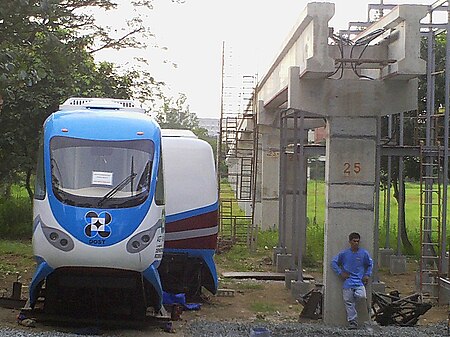UP Diliman Automated Guideway Transit System

The University of the Philippines Diliman AGT was an automated guideway transit (AGT) system constructed for technology demonstration within the campus of the University of the Philippines (UP) in Diliman, Quezon City in the Philippines. It served as a test track for the first mass transit system to be built and developed in the country by local engineers.The first phase of the project was funded by the Department of Science and Technology (DOST) in a joint project with the UP administration. DOST provided funding and supervised the first phase as well as the design of the coaches and track to be used. If found feasible, the project would be expanded into a 6.9-kilometre (4.3 mi) intracampus loop. In October 2018, the DOST announced that it would dismantle the railway line and transfer it to another university after UP declined use of the facility.
Excerpt from the Wikipedia article UP Diliman Automated Guideway Transit System (License: CC BY-SA 3.0, Authors, Images).UP Diliman Automated Guideway Transit System
Carlos P. Garcia Avenue, Quezon City Diliman (4th District)
Geographical coordinates (GPS) Address Nearby Places Show on map
Geographical coordinates (GPS)
| Latitude | Longitude |
|---|---|
| N 14.653063888889 ° | E 121.0597 ° |
Address
Community Affairs Building
Carlos P. Garcia Avenue
1100 Quezon City, Diliman (4th District)
Philippines
Open on Google Maps







